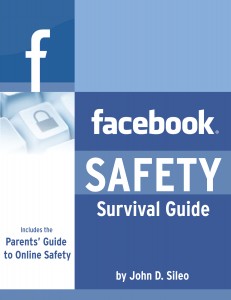Home | Solutions Blog | Must Read
Posts tagged "Must Read"
 Are you as protective of your kids as I am of mine?
Are you as protective of your kids as I am of mine?
My wife and two highly-spirited daughters are more than just the center of my universe – they are the compass by which I set my course in every aspect of life. If something is not good for the family, then it isn’t good for me. And that means that I want to do everything in my power to keep them safe.
You and I are called on to protect our children from many things, starting in the womb. Even before they are born, we practice good preventative care. We take specially designed pre-natal exercise classes, coax ourselves to eat right for their benefit, learn CPR and Love and Logic and screen regularly for signs of trouble. Once they are born, we provide the best nourishment, the finest medical care, ample playtime, rest and an infinite flow of unconditional love. You get the point… we do everything in our power to prevent complications and to give them the best chance to grow up healthy, happy and in harmony with the world around them. That is our responsibility, our purpose and our joy.
Posted in Identity Theft Prevention by Identity Theft Speaker John Sileo.
Tags: Child ID Theft, child identity monitoring, child identity theft, Child Identity Theft Expert, Must Read
Facebook safety has a direct correlation to your business’s bottom line.
Facebook, and social networking sites in general, are in an awkward stage between infancy and adulthood – mature in some ways, helpless in others. On the darker side of sites like Facebook, LinkedIn and Twitter, scammers and identity thieves are drooling at the sight of this unchecked data playground. In contrast, most social networkers are addicted to all of the friendships they are creating and renewing.
There is no denying that Facebook and other social networking sites have a very luring appeal. You can sit in the comfort of your own home and suddenly have a thriving social life. You can look up old friends, make new ones, build business relationships and create a profile for yourself that highlights only your talents and adventures while conveniently leaving out all your flaws and troubles. It is easy to see why Facebook has acquired over 200 million users worldwide in just over five years. Which is why Facebook safety is still so immature: Facebook’s interface and functionality has grown faster than security can keep up.
Unfortunately, most people dive head first into this world of social connectedness without thinking through the ramifications of all the personal information that is now traveling at warp speed through cyberspace. It’s like being served a delicious new drink at a party, one that you can’t possibly resist because it is so fun and tempting and EVERYONE is having one. The downside? Nobody is thinking about the information hangover that comes from over-indulgence: what you put on the Internet STAYS on the internet, forever. And sometimes it shows up on the front page of the Wall Street Journal, in the hands of a prospective employer or your boss’s inbox. All of the personal information that is being posted on profiles — names, birth dates, kids’ names, photographs, pet’s names (and other password reminders), addresses, opinions on your company, your friends and your enemies — all of it serves as a one-stop shop for identity thieves. It’s all right there in one neat little package and all a scammer has to do to access it is become your “friend”.
Follow these Five Facebook Safety Tips and save yourself the trouble…
5 Facebook Safety Tips
Facebook Safety Tip #1: If they’re not your friend, don’t pretend. Don’t accept friend requests unless you absolutely know who they are and that you would associate with them in person, just like real friends.
Facebook Safety Tip #2: Post only what you want made public. Be cautious about the personal information that you post on any social media site, as there is every chance in the world that it will spread beyond your original submission. It may be fun to think that an old flame can contact you, but now scammers and thieves are clambering to access that personal information as well.
Facebook Safety Tip #3: Manage your privacy settings. Sixty percent of social network users are unaware of their default privacy settings. Facebook actually does a good job of explaining how to lock your privacy down (even if they don’t set up your account with good privacy settings by default). To make it easy for you, follow these steps:
- Spend 10 minutes reading the Facebook Privacy Policy. This is an education in social networking privacy issues. Once you have read through a privacy policy, you will never view your private information in the same way. At the point the privacy policy is putting you to sleep, move on to Step 2.
- Visit the Facebook Privacy Help Page. This explains how to minimize all of the possible personal information leakage that you just read about in the privacy policy. Once you understand this on one social networking site, it becomes second nature on most of the others.
- Now it is time to customize your Facebook Privacy Settings so that only information you want shared, IS shared. This simple step will reduce your risk of identity theft dramatically.
Facebook Safety Tip #4: Keep Google Out. Unless you want all of your personal information indexed by Google and other search engines, restrict your profile so that it is not visible to these data-mining experts.
Facebook Safety Tip #5: Don’t unthinkingly respond to Friends in Distress. If you receive a post requesting money to help a friend out, do the smart thing and call them in person. Friend in Distress schemes are when a thief takes over someone else’s account and then makes a plea for financial help to all of your friends (who think that the post is coming from you). As with all matters of identity, verify the source.
Following these 5 Facebook Safety tips are a great way to prevent an information-sharing hangover.

The best way to protect you and your children from Online threats is to educate yourself about Facebook, Twitter, MySpace and other online social networking utilities. We recently published the Facebook Safety Survival Guide (with Parents’ Guide to Online Safety) with that exact goal in mind. Social networking is immensely powerful and is here for the long run, but we must learn to harness and control it.

John Sileo is the award-winning author of Stolen Lives, Privacy Means Profit and the Facebook Safety Survival Guide. His professional speaking clients include the Department of Defense, the FTC, FDIC, Pfizer, Prudential and hundreds of other organizations that care about their information privacy. Contact him directly on 800.258.8076.
Posted in Online Privacy by Identity Theft Speaker John Sileo.
Tags: Facebook, Facebook Safety, linkedin, Must Read, Online/Social Media Privacy, Privacy, social networking, twitter
 Identity Theft Speaker John Sileo on Traveling Safety.
Identity Theft Speaker John Sileo on Traveling Safety.
Traveling Safety has become a study of its own ever since the advent of identity theft. Your biggest concern may no longer be physical in nature (pickpockets, hotel theft, muggings); the value of the personal identity you carry as you travel is worth far more than the cash in your wallet.
Posted in Identity Theft Prevention by Identity Theft Speaker John Sileo.
Tags: Identity Theft Prevention, Identity Theft Speaker, John Sileo, Must Read, traveling safety
If I’ve learned one thing as an identity theft expert these past few years, it’s this: As bloggers with something to gain (monetarily) from our daily posts, we do everything we can to veil our advertisements deep within the text. Nearly every blog post has some financial gain tied to it: Google AdWords down the right side of the column, gentle product sales, magazine subscriptions, you name it.
That’s the trade-off: bloggers give you content and in return, you agree to watch our commercials. With a few exceptions (truly altruistic and non-commercial blogs, which do exist), anytime someone tells you that they gain nothing financially from their blog, tell them HOGWASH! They are simply hiding behind their content. When you get something of value, you are paying with something of value. When you read the Wall Street Journal, you agree to at least browse their advertising (however passively). When you read my blog about identity theft prevention, you learn that I speak to corporations and organizations around the world about data breach and identity theft.
Posted in Burning Questions (Video), Identity Theft Prevention, Video Tips by Identity Theft Speaker John Sileo.
Tags: identity theft expert, John Sileo, larry winget, Must Read
 Like a wounded, cornered Doberman, I was irrational and reactive.
Like a wounded, cornered Doberman, I was irrational and reactive.
My blog was down, non-existent. When you earn your keep by communicating ideas, like I do as a professional speaker, any threat to the distribution of those ideas raises the peach fuzz on the back of your neck. After days of being unable to reach my webmaster by office phone, cell phone, SMS text, instant message or email, I dialed up the pressure on him to respond. I turned to the powerful and influential world of social media…
I tweeted him. Publicly.
@johnswebguy Where in the name of Google Earth are you? Why won’t you contact me? [poetic license applied to save face]
Posted in Online Privacy by Identity Theft Speaker John Sileo.
Tags: facebook privacy, Facebook Safety, Must Read, Tweet Breach, twitter breach, twitter privacy, twitter speaker
Technology is not the root cause of identity theft, data breach or cyber crime.
We are.
Too often, technology is our scapegoat, providing a convenient excuse to sit apathetically in our corner offices, unwilling to put our money where our profits are. Unwilling, in this case, to even gaze over at the enormous profit-sucking sound that is mass data theft. The deeper cause of this crisis festers in the boardrooms of corporate America. Like an overflowing river, poor privacy leadership flows inexorably downhill from the CEO, until at last, it undermines the very banks that contain it.
The identity theft and data breach bottom line?
Posted in Identity Theft Prevention by Identity Theft Speaker John Sileo.
Tags: ceo, corporate espionage, Cyber Crime, data theft, Financial Speaker, id theft, Identity Theft Prevention, Identity Theft Speaker, John Sileo, Must Read, privacy leadership
Military personnel have unique and pressing reasons to pay extra attention to protecting themselves from military identity theft, as well as guarding the private data of their loved ones. For example:
- Historically, the armed forces have used pieces of identity (including Social Security Numbers) to openly identify personal items, including: dog tags, military IDs, commission papers, pay checks and duffel bags. While this practice is being fazed out, it still increases the risk of identity theft among military personnel.
- If a member of the military has their identity stolen while deployed (especially overseas), it is exceptionally difficult to recover from the crime in a timely and effective manner. Can you imagine trying to repair your credit rating from the streets of Iraq or prove your innocence to a collection agency while crouched in the bunkers of Afghanistan? To add insult to injury, returning from a tour to find that your credit has been destroyed and that you are wanted for crimes you didn’t commit can be overwhelming.
- Our airmen, soldiers, sailors and marines can be called to duty in an instant. If financially unprepared, this leaves their families vulnerable to attack. It is imperative that we proactively protect not only ourselves, but our loved ones as well.
- Protecting the privacy of our military is a national security concern. In the age of cyber-attacks and digital warfare, we cannot leave our fighting and peace-keeping personnel open to attack.
Because of these additional risks, it is imperative for our military personnel to implement the steps below to prevent military identity theft.
Posted in Identity Theft Prevention by Identity Theft Speaker John Sileo.
Tags: Military Identity Theft, military identity theft; air force; navy; army; marines, Must Read
Think about it…slowly, over time, we have given away our privacy. Many times we don’t even realize we are giving it away. We commonly trade our personal information for access to website content (free songs, email), the chance to win a contest (iPods, vacations) or a one-time 10% discount at a clothing retailer. I call this slow and unnecessary leakage of our personal information identity creep. Our information is requested in a subtle way, and because the immediate benefits seem substantial and often feel harmless, we overlook the downside—that we are gradually broadcasting our identity to those who shouldn’t have it.
One source at a time, we must reverse our bad habits and guard information rather than give it out. Understandably, we cannot entirely give up sharing our information. But we must determine what to share and with whom. We must begin to accumulate our privacy over time. This incremental approach keeps prevention from being an overwhelming task and reminds you to consider the risk anytime identity is involved.
Here are Eight Steps to Start the Process:
Posted in Identity Theft Prevention by Identity Theft Speaker John Sileo.
Tags: id theft tips, Identity Theft Prevention; identity theft speaker; Identity Theft Speaker; Opt Out, Must Read
 Are you as protective of your kids as I am of mine?
Are you as protective of your kids as I am of mine?

 Identity Theft Speaker John Sileo on Traveling Safety.
Identity Theft Speaker John Sileo on Traveling Safety. Like a wounded, cornered Doberman, I was irrational and reactive.
Like a wounded, cornered Doberman, I was irrational and reactive.







